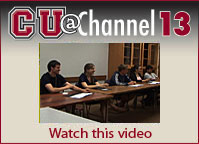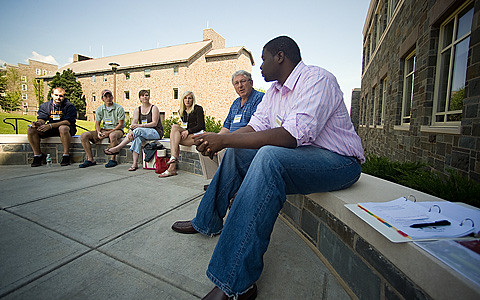 Participants in a Greek Life Summit met on campus last weekend to discuss the past, evaluate the present, and envision the future for Colgate chapters.
Participants in a Greek Life Summit met on campus last weekend to discuss the past, evaluate the present, and envision the future for Colgate chapters.
Five representatives from each of the 10 fraternities and sororities on campus collaborated with staff members, local advisers, and alumni representatives.
In all, more than 70 people contributed to the dialogue that was framed by a nationally recognized deliberation model called Fraternal Futures.
“We need to find ways to strengthen the Greek life system,” said Tim Mansfield, assistant dean of students and director of Greek life. “Because Greek life nationally is in question, we need to examine how we operate. I think we are beyond the issue of acquisition and ready to become a program of prominence.”
Participants engaged in different ways of framing complex issues. Through large open forums and moderated group dialogues with seven to 10 participants, problems were examined and action plans developed.
Students had the opportunity to discuss topics such as ways to establish a greater outreach in the Colgate community, effective outlets to communicate with the administration, and the adoption of a more fitting code of rights and responsibilities.
 |
| Some of the more than 70 participants in the Greek Life Summit take part in one of the group discussions held during the weekend. (Photo by Andy Daddio) |
“I’m hoping students can take specific actions in this system — how they recruit, how they hold each other accountable — and get at ways that take ownership of Greek life,” said Mansfield.
Charlie Stack ’04, Beta Theta Pi, agreed with Mansfield about ownership leading to responsibility and action.
“That’s why everyone was there — they wanted an ownership stake. It may not be necessary to physically own the houses for students to retain the same sense of ownership over the system,” said Stack.
“I think there is a solution where the school gets what it wants and it’s the same thing that the students want and the alums want — it all should revolve around giving students a better education both socially and academically, and a large part of that is letting them manage their own lives and living situations, to whatever extent is possible,” Stack said.
Mansfield will examine the reports that emerged from the summit and put them in an executive summary for review by the Panhellenic Council and Interfraternity Council. He also will seek input from the deans’ offices and administrators, and he hopes to reconvene in the fall.
His main goals?
“Students need to know that their action — or inaction — will ultimately shape their fraternal future,” said Mansfield. “And we don’t want to lose the momentum of this valuable summit.”